|
|
|
Sort Order |
|
|
|
Items / Page
|
|
|
|
|
|
|
| Srl | Item |
| 1 |
ID:
111027
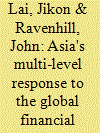

|
|
|
| 2 |
ID:
111026
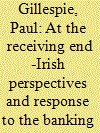

|
|
|
|
|
| Publication |
2012.
|
| Summary/Abstract |
Having enjoyed nearly two decades of economic recovery and rapid development as one of the most successful member-states of the European Union, Ireland was shocked and chastened by the global financial crisis of 2007-2008 and its traumatic impact on the country. A threefold crisis assailed its economic and political elites and citizens when the property bubble built up since 2002 exploded 6 years later. Its banking system collapsed through over-exposure to loans built up from the cheap credit made available after the euro was introduced. There was an immediate impact on state revenues when property-related windfall taxes collapsed under this pressure, exposing a yawning gap between current expenditure and revenues. And the country's economic competitiveness suffered from a runaway cost base. The paper puts these events in the context of Ireland's overall experience of European integration and its economic development. It goes on to explain how Ireland got into trouble in 2008 and tracks the major events over the next 3 years and how they were handled. Three major axes of argument about the EU/IMF rescue packages are discussed, highlighting the views of political leaders and public opinion dealing with the intensified euro zone crisis in autumn 2011. The paper goes on to assess their attitudes to EU decision-making, the role of the European Central Bank, the prospects of treaty change and Ireland's emerging position in a reconfigured Europe coming to terms with a more multi-polar world.
|
|
|
|
|
|
|
|
|
|
|
|
|
|
|
|
| 3 |
ID:
111030
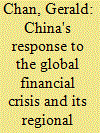

|
|
|
|
|
| Publication |
2012.
|
| Summary/Abstract |
This paper examines the role of China in the G20 and in East Asia in crafting appropriate responses and policies to the global financial crisis. Did China play an important part in the multilateralisation of the Chiang Mai Initiative, and how did China work with other players in East Asia to 'inoculate' East Asia against contagion and fallout from the crisis? The paper evaluates the type of leadership displayed by China and the decisions taken during the crisis. It assesses how the Chinese role in its own region and within global institutions such as the G20 would change in the aftermath of these crises.
|
|
|
|
|
|
|
|
|
|
|
|
|
|
|
|
| 4 |
ID:
111025
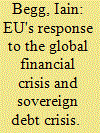

|
|
|
|
|
| Publication |
2012.
|
| Summary/Abstract |
Since the sovereign crisis erupted in the autumn of 2009 when the true scale of the Greek fiscal deficit was revealed, the European Union (EU), and especially the euro area, has staggered from crisis to crisis. Major initiatives have, however, been taken to improve economic governance and to put in place a more resilient framework for the euro. This article assesses how the EU has responded to the crisis and offers explanations for why the reform process has been slow and indecisive. It shows that potentially enduring solutions are on the table, but that they have been hard to introduce because of differing national perspectives and disagreements about how the burdens of adjustment should be shared. The article concludes by setting out plausible options and explaining what they entail.
|
|
|
|
|
|
|
|
|
|
|
|
|
|
|
|
| 5 |
ID:
111028


|
|
|
|
|
| Publication |
2012.
|
| Summary/Abstract |
The financial crisis of 2008 and even more so the crisis of the Eurozone drastically increased the demand for decisive leadership and public crisis management. Due to the size of its economy and its position in the global as well as in the European economy, Germany should take the lead in this crisis management. Germany's management of the two crises differs but also shows strong similarities. A "center-left Grand Coalition" managed the global financial crisis; a global crisis in which Germany was one among several relevant global players. A center-right government under the leadership of the same chancellor then during the sovereign debt crisis manages the Eurozone crisis. This is a regional crisis but with global implications. German government was slow in responding to both crises but acted eventually after some procrastination. Both cases, however, differ with regards to Germany's actual role in crisis management. During the global financial crisis, other global actors pushed Germany to the forefront. The Eurozone crisis, a regional crisis, demands a leading role of Germany, the largest economy and member state of the EU. The paper, however, argued that the German crisis management with regards to the Eurozone is very much driven by ideas that preserve German norms but do not live up to the challenges of the crisis. Germany's insistence in its own interests and norms hinders the delivery of a comprehensive crisis management of the Eurozone crisis within the European Union.
|
|
|
|
|
|
|
|
|
|
|
|
|
|
|
|
| 6 |
ID:
111023
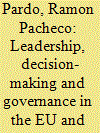

|
|
|
|
|
| Publication |
2012.
|
| Summary/Abstract |
The global financial crisis of the late 2000s has affected the EU and East Asia differently. The EU has seen its economic, political and social structures undermined by the problems derived from the global crisis and subsequent eurozone sovereign debt crisis. In contrast, East Asia has gone through the global crisis relatively unscathed and has seen its standing at the global level reinforced. As a result, there has been a reconfiguration of leadership, decision-making and governance structures in both regions. In the case of the EU, Germany has emerged as the clear leader of European efforts to solve regional economic problems. Meanwhile, intergovernmentalism has replaced supranationalism as the decision-making and even implementation procedure of choice. Differently, there is no single leader in East Asia. China has become one of the most important powers at the global level, but at the regional level, different countries have shaped East Asia's response to the crisis. Concurrently, there has been some move towards increasing integration, even though intergovernmentalism still defines governance structures in the region. Thus, the global financial crisis of the late 2000s has helped to shape new leadership, decision-making and governance structures in both regions.
|
|
|
|
|
|
|
|
|
|
|
|
|
|
|
|
| 7 |
ID:
111022


|
|
|
| 8 |
ID:
111032
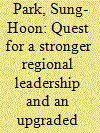

|
|
|
|
|
| Publication |
2012.
|
| Summary/Abstract |
The Korean economy has suffered two major economic crises over the past 15 years - the 1997 Asian financial crisis and the 2008 global financial crisis. After analyzing both the changes in policy environments and Korea's policy responses, the article argues that the ongoing global financial crisis provided a welcomed opportunity for Korea to increase its regional and global influence. Korea's regional leadership has been strengthened especially in promoting the "development" issue in a number of international forums and in establishing a more effective crisis-prevention framework in the Asian region. As the host country of the 5th G20 Summit Meeting in 2010, Korea initiated a number of global issues, such as "development", "global financial safety net", "green growth strategy", and has been successful in fortifying its position in the global arena. As a result, the global profile of Korea appears to have been raised both substantially and substantively.
|
|
|
|
|
|
|
|
|
|
|
|
|
|
|
|
| 9 |
ID:
111033
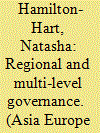

|
|
|
|
|
| Publication |
2012.
|
| Summary/Abstract |
Although the economies of East Asia emerged from the global financial crisis of 2008 in comparatively strong positions, they remain structurally embedded within global markets. The degree of regional integration that has occurred within East Asia is thus predicated on the on-going interdependence with the economies of Europe and North America. Moves to advance East Asian regional cooperation in the wake of the crisis reflect this global interdependence, as well as intra-regional differences in interests and a lack of strong leadership within the region. Modest cooperation on an East Asian basis has continued since 2008 but the region is very far from realising a substantive regional governance model on economic and financial issues and does not appear to be pursuing a distinctive governance agenda. This article examines recent developments in East Asian regional cooperation, with a view to assessing the significance of current achievements and explaining the mixed and sometimes contradictory nature of initiatives for regional governance in East Asia.
|
|
|
|
|
|
|
|
|
|
|
|
|
|
|
|
| 10 |
ID:
111031
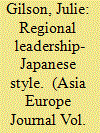

|
|
|
|
|
| Publication |
2012.
|
| Summary/Abstract |
The Japanese government faces many competing challenges as it seeks to balance its multilateral and bilateral relationships within and beyond the region: whilst addressing its rapidly changing contentious domestic politics, there is pressure for it to realign relations with the USA, manage the rise of China, strengthen links with its region and continue to deal with its lingering historical legacy. All of these demands are now set against the backdrop of a so-called 'lost decade' of economic woes and global economic recession. This article demonstrates how the Japanese government is apparently adopting a de facto multilevel foreign policy, attempting to engage in a range of bilateral and collective initiatives simultaneously and to assume a regional leadership role whilst having to manage difficult bilateral relations, notably with the USA and China.
|
|
|
|
|
|
|
|
|
|
|
|
|
|
|
|
| 11 |
ID:
111029
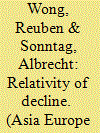

|
|
|
|
|
| Publication |
2012.
|
| Summary/Abstract |
This article is an attempt, in the context of the Eurozone crisis that has shaken Europe since 2008, to explore and deconstruct two pieces of conventional wisdom on French leadership in Europe and the world. The stereotypical image of a country in decline and denial, out of touch with today's globalised world, is reproduced so often in the Anglo-American media and even in scholarly discourse, that is has become a self-evident truism. The article examines this truism in two different perspectives: there is, on the one hand, the axiom that France has lost influence in Europe and that the balance of power has shifted inexorably to Germany and, on the other hand, the axiom that Europe does not matter in the global 'power shift' and that, as part of Europe, France does not count any more either. In questioning the origins and validity of these axioms, the authors argue that a strong perception bias persists and is constantly perpetuated even though reality has changed. Not only has France rather successfully adapted to globalisation in both political and economic terms, but it has also found new ways and discourses about its role as Germany's partner in leadership in the European Union. The paper goes on to show that both France and the EU retain and use significant levers for action in three dimensions of power-coercion, agenda-setting and attraction. It concludes that going into 2012, France remains an active and important actor, both in the EU and on the global scene. It is present and influential in major international institutions, effectively builds international coalitions and floats important ideas on reforming laissez-faire capitalism.
|
|
|
|
|
|
|
|
|
|
|
|
|
|
|
|
| 12 |
ID:
111034
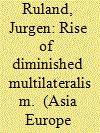

|
|
|
|
|
| Publication |
2012.
|
| Summary/Abstract |
The article argues that the "principled multilateralism" of the immediate post-Cold War period is increasingly giving way to what may be called a "diminished multilateralism." Newly emerging global and regional powers such as the BRICS states (Brazil, Russia, India, China and South Africa) and other rising powers in the Global South are increasingly questioning the legitimacy of the existing international architecture which they regard as a vehicle of the USA and Western countries to conserve their international influence in an era of rapid change. In the process, international institutions have increasingly become arenas of power rivalries which take the form of contests over access and membership, decision-making rules and normative order. The result is an increasing paralysis of these institutions and their inability to solve global problems. One aspect of these institutional power struggles is "forum shopping." The article shows that East Asia and Europe have both become active players in forum shopping. Three conditions facilitated forum shopping: major crises and external shocks; sentiments of frustrated entitlement in connection with exclusive and discriminatory international institutions, and extra- and intra-regional power shifts.
|
|
|
|
|
|
|
|
|
|
|
|
|
|
|
|
| 13 |
ID:
111024
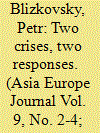

|
|
|
|
|
| Publication |
2012.
|
| Summary/Abstract |
The financial crisis of 1997/1998 in Southeast Asia triggered institutional developments inside the Association of Southeast Asian Nations (ASEAN) and beyond. They deepened intra-regional cooperation in the economic area and laid down the foundations for the ambition of creating an ASEAN Economic Community that would allow easier exchanges of productive factors. Concurrently, ASEAN also widened its response in the financial domain by initiating various "ASEAN plus" arrangements to pool risks and address volatility in financial markets. The European Union (EU) was hit by the global financial crisis in 2008 and subsequently by the sovereign debt crisis. The EU response to this has been a deepening of legally binding macroeconomic cooperation and the strengthening of the regulatory framework. On top of this, and contrary to the ASEAN case, the EU 27-Minus initiatives go further towards closer political coordination. In parallel, the legally binding scheme has been adopted to strengthen the stability of the Euro Area. This paper analyses the policy responses in both regions to their respective crises. It aims at understanding the driving forces behind the different policy responses, looking at both the region-specific and the more generic institutional and regulatory responses to the crises.
|
|
|
|
|
|
|
|
|
|
|
|
|
|
|
|
|
|
|
|
|